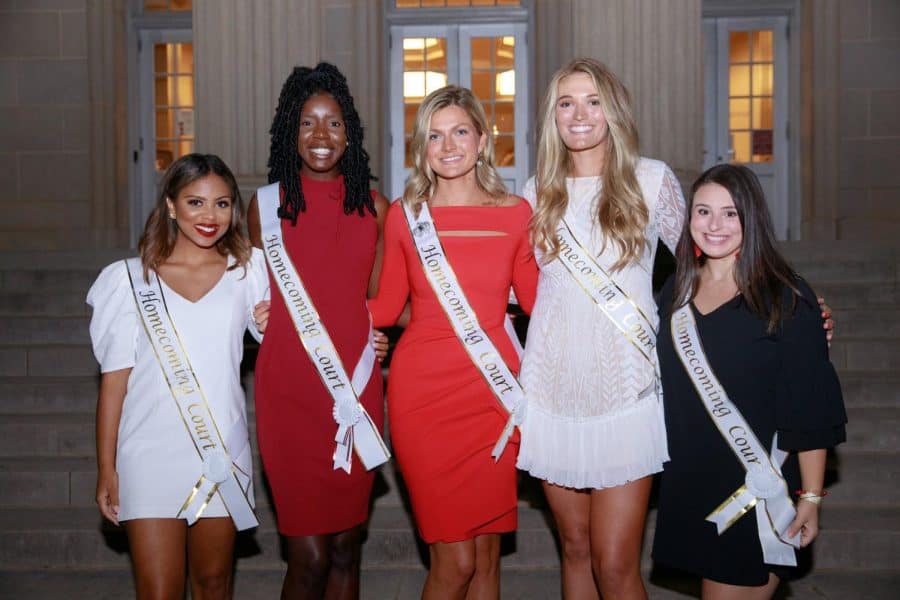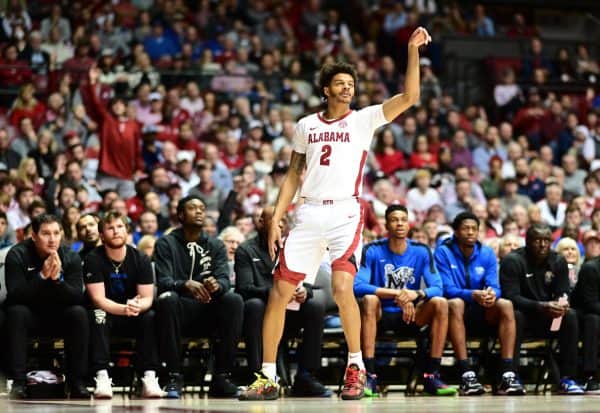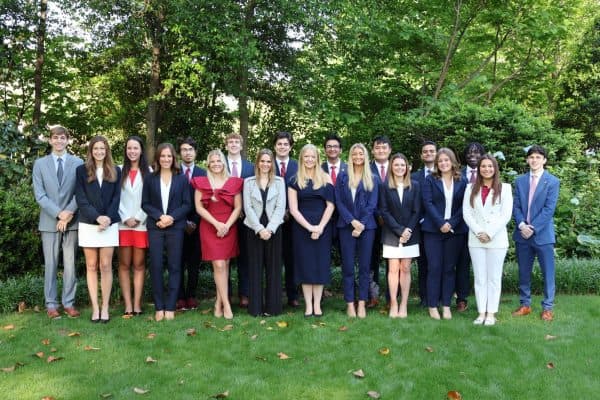The new Homecoming Queen election rules, in-depth
August 31, 2022
Editor’s Note (09/02/2022): This story was updated to note that the homecoming queen requires the most votes to win, not the majority of the votes.
The University of Alabama released its new process for homecoming queen elections Tuesday, close to a year after former Vice President for Student Life Myron Pope announced the creation of the committee to recommend changes following the controversial election of McLean Moore as the 2021 homecoming queen.
The new process is based on the recommendations of the 11-person task force headed by John Richardson, a junior and SGA senator.
“Our goal as a task force was to understand the things that our previous homecoming system did really well, and the failures of it as well,” Richardson said. “We looked at the full context of the situation … and really attempted to come up with a solution that created a square deal for every single student on campus.”
According to the new page on the University’s Homecoming website dedicated to the new homecoming queen process, the “core pillars” of the homecoming queen — “service, leadership, scholarship and character” — will “guide each part of the selections process.”
The selection process will consist of three parts: essays, interviews and a general election.
Application and essay portion
To start the selection process, each candidate must submit an application with their resume, a statement of intent and “general qualifying information” including GPA and credits earned. Additionally, the candidates will submit “a series of four essay responses (500 words or less) which will be scored by a selected panel of five faculty with a prescribed rubric.” The essay questions are derived from each of the four “core pillars” of the homecoming queen.
The essay portion of the selection process will be graded by a five-person Faculty Essay Committee consisting of members from the Faculty Senate and multiple colleges. The committee members will be chosen through a nomination process, which was not outlined.
Each of the four essays will receive between zero and four points according to rubric criteria. Applicants will also be scored for writing ability and essay structure. The full scoring table is below.
| Service Question
|
Leadership Question
|
Character Question
|
Scholarship Question
|
Writing Ability and Essay Structure | Total | |
| Judge 1 | 0-4 pts | 0-4 pts | 0-4 pts | 0-4 pts | 0-4 pts | 0-20 pts |
| Judge 2 | 0-4 pts | 0-4 pts | 0-4 pts | 0-4 pts | 0-4 pts | 0-20 pts |
| Judge 3 | 0-4 pts | 0-4 pts | 0-4 pts | 0-4 pts | 0-4 pts | 0-20 pts |
| Judge 4 | 0-4 pts | 0-4 pts | 0-4 pts | 0-4 pts | 0-4 pts | 0-20 pts |
| Judge 5 | 0-4 pts | 0-4 pts | 0-4 pts | 0-4 pts | 0-4 pts | 0-20 pts |
| Total | 0-20 pts | 0-20 pts | 0-20 pts | 0-20 pts | 0-20 pts | 0-100 pts |
Candidate Interviews
According to the website, “The Homecoming Queen interview will be approximately 15 to 20 minutes and seeks to allow for the interview panel to put a face to words and resume, as well as getting to know each candidate. The questions will be derived from the topics provided as the basis for the Pillars of Homecoming Queen.”
The interviews will be led by the Interview Panel, which “will consist of five members from the Steering & Advisory Committee. The members of the interview panel will be represented by three students and one alumni and one faculty/staff member. Students will be selected and given consideration on the panel for representing differing perspectives.”
If a “differing perspective cannot be found among the Steering & Advisory Committee,” an application process will recruit students to fill those spots. Additionally, interview panel members are not permitted to be involved in the Elections Review & Dispute Panel.
When asked what was meant by a “differing perspective,” Richardson said, “I would think it’s essentially what the word means, right? Which is that each of us brings unique and different perspectives … you don’t want people from the same sides of campus that are doing the exact same things; you want different perspectives from the student body.”
The interview questions are available on the homecoming queen information page.
Similar to the essay portion of the process, each pillar’s question will be worth 20 points, with an additional 20 points available for meeting personal presence and professionalism criteria. The full scoring table is below:
| Service Question
|
Leadership Question
|
Character Question
|
Scholarship Question
|
Personal Presence and Professionalism
|
Total | |
| Judge 1 | 0-4 pts | 0-4 pts | 0-4 pts | 0-4 pts | 0-4 pts | 0-20 pts |
| Judge 2 | 0-4 pts | 0-4 pts | 0-4 pts | 0-4 pts | 0-4 pts | 0-20 pts |
| Judge 3 | 0-4 pts | 0-4 pts | 0-4 pts | 0-4 pts | 0-4 pts | 0-20 pts |
| Judge 4 | 0-4 pts | 0-4 pts | 0-4 pts | 0-4 pts | 0-4 pts | 0-20 pts |
| Judge 5 | 0-4 pts | 0-4 pts | 0-4 pts | 0-4 pts | 0-4 pts | 0-20 pts |
| Total | 0-20 pts | 0-20 pts | 0-20 pts | 0-20 pts | 0-20 pts | 0-100 pts |
Selection of the Homecoming Court
Following the completion of both the essay and interview portions of the process, the five applicants with the highest combined essay and interview scores “advance to the general election and the official five-person UA Homecoming Court.”
Campaign Process
Following the selection of the homecoming court, “these candidates will then have two weeks before the election to order campaign material and plan a campus-wide campaign. Their statement of intent and a photo will be published on the Homecoming website.”
According to the website, “Campaigning is defined as, but not limited to, any written statement, speaking engagement, display or active distribution of any campaign material and/or activity that is intended to encourage voting for an individual candidate or group of candidates.”
If the campaign guidelines are violated by a candidate’s team or groups where the candidate is a member, the candidate will be held responsible. However, media coverage of a particular candidate is not considered campaigning.
Many of the campaign rules for homecoming queen are identical to sections of the SGA’s Elections Manual, such as a rule that prohibits candidates from campaigning inside or within 25 feet of a University building. The SGA removed itself from overseeing the homecoming queen election after the controversy with last year’s election.
Candidates will be limited to $500 for “campaign materials and marketing support only. This budget may include in-kind sponsorship, meaning a donation of items, goods or services. The in-kind donation would have to be from a business or registered student organization” and would require proof of the gift’s monetary value.
Candidates will be required to provide “all receipts and estimates, in addition to all contact information for all services provided.”
Last year’s election had McLean Moore originally reporting $0 in campaign contributions and expenditures, despite having professional-quality campaign videos and personalized signs and buttons. She later revised her form to report expenditures. Moore and Montana Fouts, the runner up in the homecoming queen election last year, both failed to submit timely financial disclosure forms. Savanah Lemon, another candidate, reported $400 in expenditures —$50 over the imposed limit last year — before revising her form to report $350.
Election
Any student will be permitted to vote during the general election, which will occur on Oct. 18, from 7 a.m. to 7 p.m. This year, students will no longer have the option to write in a candidate. The winner will be determined by which candidate receives the most votes. Last year, the Elections Board ruled McLean Moore needed the highest number of votes compared to her competitors to win after confusion over the rules in the elections manual.
The queen will still be announced at the Homecoming Pep Rally and Bonfire before the Homecoming Game.
Elections Review and Dispute Panel
Under the new guidelines, homecoming elections will fall under the purview of the Elections Review and Dispute Panel, instead of the SGA Elections Board. The panel will consist of “two faculty/staff, three students and two alumni members, with appointment consideration given to differing perspectives being represented. Additionally, at least five members are required to be present when reviewing a dispute.”
During the essay and interview round, only candidates will be allowed to submit appeals complaints, but during the campaign and general election, any UA student is allowed to submit.
Panel meetings will be held to resolve any filed disputes, and “All announcements regarding review would be disseminated at the conclusion of their review during the windows below or no less than six hours before the announcement of winners of any portion of the process.”
The panel’s decisions are final, and no appeals will be granted.
Similar to the previous elections process, “an accumulation of 15+ violation points of any kind (minimal, intermediate, major or minor) will result in disqualification.”
Violations range from “use of unsolicited bulk mail messages,” which would be a minimal violation worth one point, to election fraud, unethical campaign tactics or failure to file financial disclosure forms, which would be a major violation worth nine points.
The 2022 homecoming queen application will open on Sept. 1.











